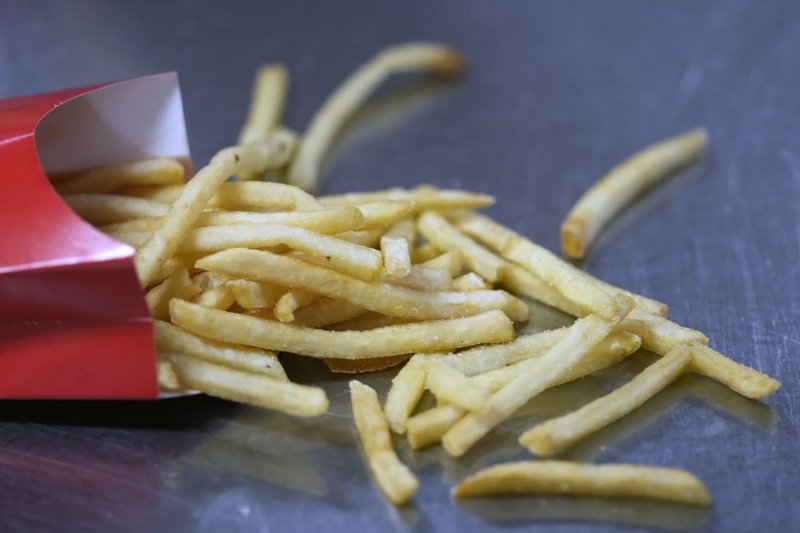High-fat, high-sugar foods rewire brain to want more of them, study says
A new study released Wednesday said brains rewire to crave fatty, sugary foods after eating them.
March 22 (UPI) -- The reason why we love french fries, crisps and chocolate bars so much has less to do with a lack of willpower and more to do with the brain learning to prefer such high-fat, sugary foods, according to a new study by German and U.S. researchers.
Results of the study, conducted by researchers from the Max Planck Institute for Metabolism Research in Cologne, Germany, and Yale University, was published Wednesday in the journal Cell Metabolism.
During their investigation, researchers gave one group of volunteers a small pudding containing a lot of fat and sugar per day for eight weeks in addition to their normal diet.
A second, control group received a pudding that contained the same number of calories, but less fat. The volunteers' brain activity was measured before and during the eight weeks.
"Using an interventional study in healthy, normal-weight participants, we demonstrate that, independent of body weight gain and alterations in metabolic markers, exposure to [high-fat, high-sugar] food reduces preferences for low-fat food," the study said.
That, in turn, "plays a critical role in up-regulating brain responses to anticipation and consumption of highly palatable, energy-dense food, and has a generalized effect on the neuronal encoding of PEs in the context of associative learning and independent of food rewards."
Researchers found in the group that ate the high-sugar and high-fat pudding that brain's responses to them were greatly increased. For those participants, the diet activated the dopaminergic system -- the region in the brain responsible for motivation and reward.

"Our measurements of brain activity showed that the brain rewires itself through the consumption of chips and co," wrote Marc Tittgemeyer, of the Max Planck Institute for Metabolism Research, who led the study.
"It subconsciously learns to prefer rewarding food. Through these changes in the brain, we will unconsciously always prefer the foods that contain a lot of fat and sugar."
Researchers said, though, that the participants who ate high-fat, high-sugar pudding did not gain more weight than those in the other group, and their blood sugar or cholesterol did not change, either.
Researchers said the rewiring of the brain was important to document because it is rooted in more unhealthy addictions.
"Many modern processed foods are high in energy density and frequently contain both fat and sugar, which interact to potentiate reinforcement beyond the energetic value," the study said.
"Modern processed foods are therefore potent reinforcers and, as with drugs of abuse, animal models have shown that their frequent consumption rewires brain circuits, even in offspring born to mothers consuming a high-fat diet (HFD) during lactation.
"Also akin to addictive drugs, there is evidence that this rewiring promotes further consumption of highly palatable energy-dense foods."
The study comes on the heels of British research released in February that said that people eating more ultra-processed foods -- such as cookies, chips and sodas -- may be linked to a higher risk of developing and dying from cancer.
Researchers at Imperial College London's School of Public Health observed the diets of 200,000 adults in Britain over 10 years and found that eating foods higher in salt, fat, sugar and artificial additives may be linked to an increased risk of developing cancer, specifically ovarian and brain cancers.
"It subconsciously learns to prefer rewarding food. Through these changes in the brain, we will unconsciously always prefer the foods that contain a lot of fat and sugar."
Researchers said, though, that the participants who ate high-fat, high-sugar pudding did not gain more weight than those in the other group, and their blood sugar or cholesterol did not change, either.
Researchers said the rewiring of the brain was important to document because it is rooted in more unhealthy addictions.
"Many modern processed foods are high in energy density and frequently contain both fat and sugar, which interact to potentiate reinforcement beyond the energetic value," the study said.
"Modern processed foods are therefore potent reinforcers and, as with drugs of abuse, animal models have shown that their frequent consumption rewires brain circuits, even in offspring born to mothers consuming a high-fat diet (HFD) during lactation.
"Also akin to addictive drugs, there is evidence that this rewiring promotes further consumption of highly palatable energy-dense foods."
The study comes on the heels of British research released in February that said that people eating more ultra-processed foods -- such as cookies, chips and sodas -- may be linked to a higher risk of developing and dying from cancer.
Researchers at Imperial College London's School of Public Health observed the diets of 200,000 adults in Britain over 10 years and found that eating foods higher in salt, fat, sugar and artificial additives may be linked to an increased risk of developing cancer, specifically ovarian and brain cancers.

No comments:
Post a Comment